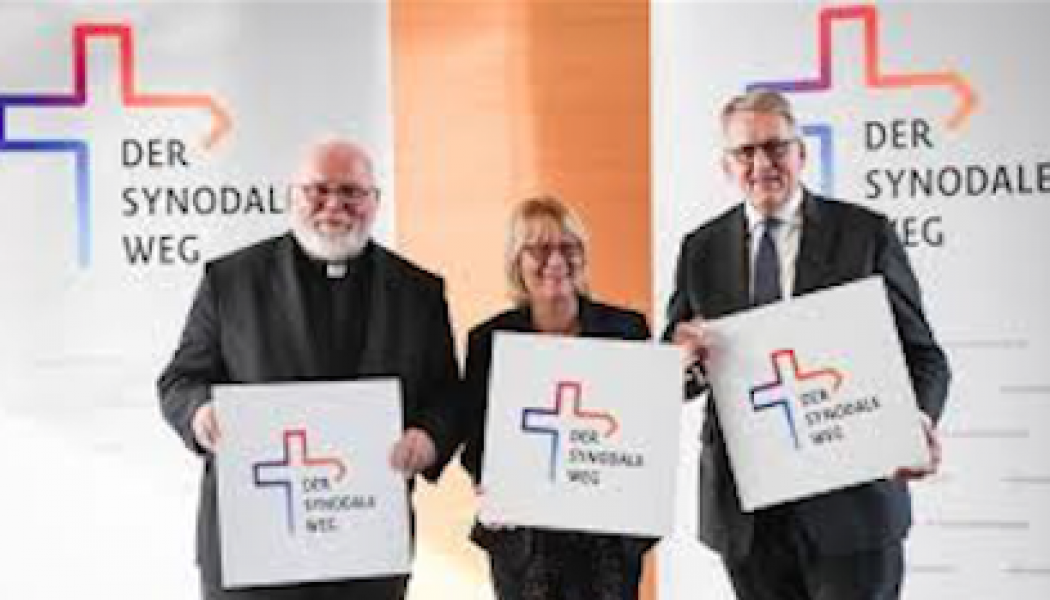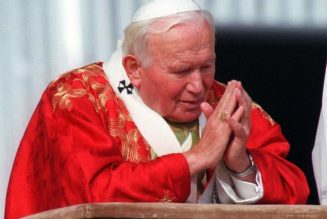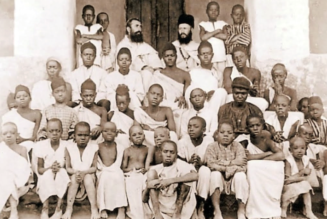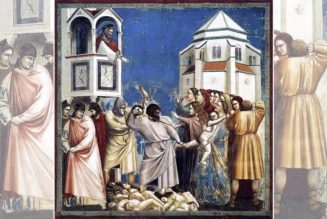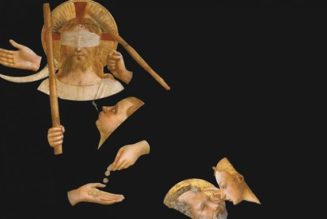
> Italiano
> English
> Español
> Français
> All the articles of Settimo Cielo in English
*
The coronavirus pandemic has made the “synodal path” of the Church of Germany disappear from the news. But meanwhile it continues forward. And on it not only the German Church, but the universal Catholic Church is staking its future:
> Francis and the Schism of Germany. History of a Nightmare
The synod held its first session in Frankfurt from January 30 to February 1. And the inaugural Mass, officiated by Munich cardinal Reinhard Marx, provided the portrait of it, with bishops, priests, and lay people, men and women, mixed together in the nave and arranged in alphabetical order, exactly as in the synodal assembly where each of the 230 delegates votes on an equal footing with the rest and the bishops are in the minority.
The opening session confirmed what was already known. That even among the bishops the dissenters can be counted on the fingers of one hand. Left to contest the dreaded slide toward a Protestant model of Church are Cardinal Rainer Maria Woelki, archbishop of Cologne, and the bishops Rudolf Voderholzer of Regensburg, Stefan Oster of Passau, Gregor Maria Hanke of Eichstätt, and Wolfgang Ipolt of Görlitz.
All the others, meaning the overwhelming majority of the synodal assembly, instead lean toward substantial changes in Catholic doctrine and practice in the four areas that will be the object of deliberation: power in the Church, the priesthood, women, and sexual morality.
It is true that the final resolutions will have a differentiated effect: to be applied immediately if of local impact; subject to approval by the pope if of more general interest; entrusted to an ecumenical council if to be applied to the whole Church on matters of the utmost importance.
But in any case, if for example the German synod approves the conferral of sacred orders on women, this and other resolutions will remain alive even without the pope’s approval, as a permanent challenge to the universal Church launched by an influential portion of it.
The synod will meet again in September, when the four 35-member forums entrusted with the four topics on the agenda will submit their guidelines to the assembly.
In the meantime, however, there are already preparatory documents, drawn up last fall and winter in four pre-forums. The full texts – for a total of 90 pages – are available in German on the official website synodalerweg.de and in Italian in the magazine “Il Regno” of March 1 2020.
The following is an anthology of three of these four documents, on the main points of rupture.
*
POWER
“Gender equality must be achieved at all levels. For access to pastoral services, even to the diaconal, presbyteral, and episcopal ministry, it cannot be excluded.”
“The institutional order linked to a hierarchy as ‘sacred power’ is due not so much to a Catholic necessity as to an anti-modern mental prejudice.”
“In this context, access to the ordained ministry must also be clarified. On the synodal journey we must openly discuss married priests and the access of women to these ministries, including the ordained ministry.”
“Representatives, men and women, of the Church’s people chosen through consultations and elections must participate in the occupation of positions of governance in the Church.”
“For the designation of the bishop, the fundamental principle of the ancient Church applies: ‘What concerns all must also be decided by all.’ For consultations and elections, mandatory qualified participation is needed, not only of clerics, but of all the people of God belonging to a local Church.”
“For all positions of governance, selection processes should be introduced in the form of elections and deliberations with the participation of all the people of God, adequately represented by the elect.”
“All those who exercise leadership roles must be supervised and held to account, both by democratically chosen bodies and by an independent jurisdiction.”
WOMEN
“The evident discrepancy between the position of the magisterial documents and the unanimous argument of theological scholarship on the question of the female call to the ministerial apostolate is a ‘skandalon’ that must be overcome for the sake of the credibility of the proclamation of the Paschal Gospel.”
“A discrepancy is perceived between the equal dignity of man and woman, continually underlined in the declarations of the Church, and the de facto unequal participation of women in the life of the Church in ministerial co-responsibility.”
“In public perception and also in that within the Church there is a considerable difference between the statements of theologians on the possibility of the call of women as well to the services and ministries of the Church and the reception of these realizations by the Magisterium of the Church. In recent times protests have also been organized at the level of Christian communities (for example by women’s associations and the Maria 2.0 movement). These processes must be taken very seriously as expressions of the ‘sensus fidelium.’ If this does not happen, matters could proceed to a division from the outside of the Catholic Church, which can already be glimpsed on the inside.”
“In theological research we do not agree on how binding is the affirmation in the apostolic letter ‘Ordinatio sacerdotalis’ of Pope John Paul II, acccording to which the exclusion of women from the sacramental ministry must be ‘definitive tenendam,’ or a decision ‘to be definitively held by all the Church’s faithful.’ […] In this regard, it is necessary to consider the fundamental theme of the development of dogmas […] and also to evaluate what theological importance is held by the perception of the non-reception of an opinion of the magisterium among the people of God.”
“A further development of the ministry of proclamation could lead to entrusting women and men employees or volunteers with the task of preaching, baptism, assistance with marriage, blessing the sick, and funerals. This is already happening in many dioceses.”
“Questions about the appropriateness of a doctrinal decision in the context of the universal Church must be separated from the question of principle on the theological legitimacy of the argument. What must be justified is not the admission of women to the ordained sacramental ministry, but their exclusion.”
“Women must participate in appreciable numbers in the consultations and decisions of the assemblies of bishops worldwide, at least with the right to vote.”
“In recent times there have been the decisions of the associations of Catholic women in Germany (KFD and KDFB), as well as of the Central Committee of German Catholics (ZDK), in which on the basis of theological arguments there is highlighted the need for women’s participation in all ordained ministries. These decisions and their justifications should be evaluated and appraised on the synodal journey and made part of an open and fruitful synodal dialogue with the universal Church and the papal magisterium. As Pope Francis points out, it is a matter of exercising together the ‘sentire cum ecclesia,’ listening to the true requests of the communion of Christian faith.”
SEX
“Turning one’s attention to what happens between those who love each other today … can even mean scenting the work of the Spirit and the action of God in unusual places.”
“The normative postulates of current Catholic sexual morality contradict the knowledge of the human sciences on the multiple dimensions of meaning of human sexuality.”
“Catholic sexual morality is perceived as a pure ‘morality of prohibition,’ and its arguments and language are judged as incomprehensible and removed from real life. Furthermore, the Church’s ban on socially and legally recognizing homosexual couples is judged as discrimination based on sexual orientation.”
“The pessimistic Augustinian view of sexuality continues to influence the declarations of the magisterium (‘Humanae vitae,’ Catechism of the Catholic Church). […] Even the ‘theology of the body’ of John Paul II, which was intended to be a personalistic exploration of sexual doctrine, does not give answers to these areas of human sexuality. […] In the individual declarations of the magisterium regarding pre-marital and extra-marital sexuality, as well as autoeroticism, the negative evaluation of sexual pleasure continues to dominate. […] The first helpful guidelines are found in ‘Amoris laetitia’ [by Pope Francis].”
“Family planning, even with the help of artificial means of regulating conception, does not represent an act hostile to life, but supports the right of a couple to decide responsibly on the number of children, on the spacing of births, and on the concrete means of family planning.”
“Homosexual acts also realize positive values of meaning if they are an expression of friendship, reliability, loyalty, and life support.”
“Due to various life situations, all persons are not able to enter into a full form of couple relationship. Remaining continent in these life situations, which often are not freely chosen, represents for many persons an excessive demand.”
“It is necessary to recognize homosexual life unions without reservation and to give up morally discrediting their sexual practice.”
“People should not only have the right to say no to sexual acts they don’t want, but also the right to say yes to sexual acts they do want and to choose whom they love.”
“In this context, there is a clear tendency among German Catholics to see the legal recognition of homosexual unions and their equal treatment with respect to marriage as a mandate of justice. […] If relationships in which values such as love, friendship, reliability, fidelity, and mutual dedication are lived deserve recognition from the moral point of view, then one must also reflect on a liturgical recognition of the same. […] Many think that it is right and positive to offer a ceremony of blessing to homosexual couples as well.”
.
